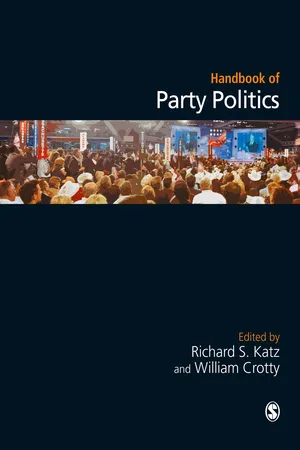
Handbook of Party Politics
- 560 pages
- English
- PDF
- Available on iOS & Android
Handbook of Party Politics
About This Book
?This thoughtful and wide-ranging review of parties and party research contains contributions from many of the foremost party scholars and is a must for all library shelves?
- Richard Luther, Keele University
?The study of political parties has never been livelier and this genuinely international Handbook – theoretically rich, comparatively informed, and focused on important questions – defines the field. This volume is both an indispensable summary of what we know and the starting point for future research?
- R K Carty, University of British Columbia
?Political parties are ubiquitous, but their forms and functions vary greatly from regime to regime, from continent to continent, and from era to era. The Handbook of Party Politics captures this variation and richness in impressive ways. The editors have assembled an excellent team, and the scope of the volume is vast and intriguing?
- Kaare Strom, University of California, San Diego
Political parties are indispensable to democracy and a central subject of research and study in political science around the world. This major new handbook is the first to comprehensively map the state-of-the-art in contemporary party politics scholarship.
The Handbook is designed to:
-provide an invaluable survey of the major theories and approaches in this dynamic area of study and research
-give students and researchers a concise ?road map? to the core literatures in all the sub-fields of party related theorizing and research
-identify the theories, approaches and topics that define the current ?cutting edge? of the field.
The Handbook is comparative in overall approach but also addresses some topics to be addressed in nationally or regionally specific ways. The resulting collaboration has brought together the world?s leading party theorists to provide an unrivalled resource on the role of parties in the pressing contemporary problems of institutional design and democratic governance today.
Frequently asked questions
Information
Table of contents
- Cover
- Contents
- Acknowledgements
- List of Contributors
- Introduction
- Part I: Definition of party
- Chapter 1 - What is a political party?
- Chapter 2 - The nineteenth-century origins of modern political parties: The unwanted emergence of party-based politics
- Chapter 3 - Party origins and evolution in the United States
- Chapter 4 - Party in democratic theory
- Chapter 5 - Political parties and deliberative democracy?
- Chapter 6 - Party systems and party system types
- Chapter 7 - Party system change
- Part II: Functions of party
- Chapter 8 - Political parties as mechanisms of social choice
- Chapter 9 - Recruitment
- Chapter 10 - Candidate selection: Methods and consequences
- Chapter 11 - Political parties in a changing campaign environment
- Chapter 12 - On the cusp of change: Party finance in the United States
- Chapter 13 - Political parties, American campaigns, and effects on outcomes
- Chapter 14 - Parties and government: Features of governing in representative democracies
- Chapter 15 - Parties government: Still many puzzles
- Chapter 16 - Party patronage and party colonization of the state
- Chapter 17 - Exceptionalism in the United States
- Chapter 18 - Party system institutionalization and party systems theory after the third wave of democratization
- Chapter 19 - Party politics in post-communist transition
- Chapter 20 - Party, ethnicity and democratization in Africa
- Part III: Party organization
- Chapter 21 - Party models
- Chapter 22 - African Exceptionalism
- Chapter 23 - Movement parties
- Chapter 24 - Political parties as multi-level organizations
- Chapter 25 - Party membership and participation
- Chapter 26 - Electoral mobilization in the United States
- Chapter 27 - Professional staff in political parties
- Chapter 28 - Party crashers? The relationship between political consultants and political parties
- Part IV: Party and society
- Chapter 29 - Party and social structure
- Chapter 30 - Clevages
- Chapter 31 - Political parties and social capital, political parties or social capital
- Chapter 32 - Political parties and social structure in the developing world
- Chapter 33 - Political parties and other organizations
- Chapter 34 - Clientelism and party politics
- Chapter 35 - Party as a carrier of ideas
- Chapter 36 - Identifying dimensions and locating parties: Methodological and conceptual problems
- Part V: Parties and the state
- Chapter 37 - Party law
- Chapter 38 - Regulation of party finance
- Chapter 39 - Legal regulation and protection of American parties
- Chapter 40 - Party states and state parties
- Part VI: Parties in the future
- Chapter 41 - The international role of political parties
- Chapter 42 - The European Union and political parties
- Chapter 43 - Party transformations: The United States and Western Europe
- Chapter 44 - Parties in the media age
- Chapter 45 - Cyber parties
- Index